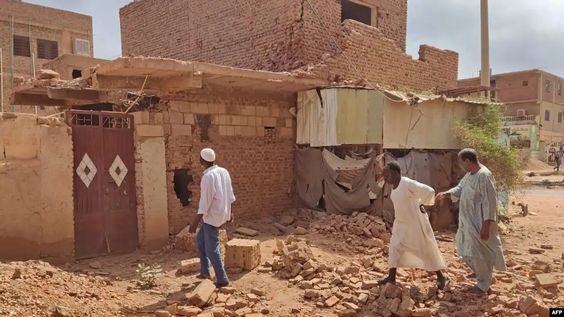Africa
As fighting continues, Egypt will host a summit of Sudan’s neighbors

Egypt announced on Sunday that it would hold a summit of Sudan’s neighbors on July 13 to discuss methods to resolve a 12-week battle between opposing Sudanese military factions that has sparked a severe humanitarian crisis in the area.
Conflicting approaches have made it unclear how the warring sides might be pushed to negotiate, making diplomatic efforts to stop combat between Sudan’s army and the Rapid Support Forces (RSF) so far unproductive.
Neither Egypt, widely seen as the Sudanese army’s most crucial foreign supporter, nor the United Arab Emirates, which has had close links to the RSF, have taken a prominent public role.
Additionally, no nation participated in the discussions in Jeddah that were chaired by the US and Saudi Arabia and ended last month without achieving a long-term halt to hostilities.
Egypt and Ethiopia, Sudan’s two largest neighbors, have been at war recently over the building of a sizable hydroelectric dam on Ethiopia’s Blue Nile, not far from the country’s border with Sudan.
The Thursday summit in Cairo intends to “develop effective mechanisms” with neighboring governments to settle the issue amicably, in collaboration with other regional or international efforts, according to a statement from Egypt’s president.
In the meantime, Sudanese delegations, including those from the civilian parties that co-ruled with the army and RSF following the toppling of the former president Omar al-Bashir four years ago, are scheduled to meet on Monday in the Ethiopian capital Addis Abeba for preliminary discussions.
Although the timing of the discussions is uncertain because passage into and out of Sudan is still difficult due to the violence, the leaders of the former rebel factions from Darfur that signed a partial peace agreement in 2020 are anticipated to come to Chad for talks.
More than 2.9 million people have been displaced by the fighting that started on April 15 in Sudan’s capital Khartoum, including about 700,000 who have fled to other nations, many of which are suffering from poverty and the effects of domestic war.
The International Organization for Migration’s most recent statistics show that over 255,000 people have entered Egypt.
According to locals, there were fights on Sunday between the army and the RSF in El Obeid, southwest of Khartoum, as well as in the south of the capital.
On Saturday, the Sudanese health ministry said that 22 people had died as a result of a fighter aircraft attack on Omdurman, which is a suburb of the larger capital of Sudan. Antonio Guterres, the secretary general of the United Nations, denounced the act.
The army disputed involvement for the strike on Sunday, claiming that its air force had not struck targets in Omdurman the day before and that the RSF had bombarded residential areas from the ground at periods when fighter jets were in the skies before falsely accusing the army of inflicting civilian casualties.
To try to drive back RSF troops dispersed throughout Khartoum, Omdurman, and Bahri—the three cities that make up the capital near the confluence of the Nile—the army has mostly relied on airstrikes and heavy artillery.
Other areas of Sudan have also seen an increase in violence, including Darfur in the west, where locals claim that the RSF and militias from Arab tribes have been targeting civilians based on their ethnicity, increasing concerns that the mass crimes that occurred there after 2003 will happen again.
